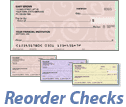
Identity Theft (Click here to view online tutorial.)
What is identity theft?
Identity theft occurs when someone acquires your personal information and uses it without your knowledge to commit fraud or theft. It is a serious crime and cases are growing. An all-too-common example is when an identity thief uses your personal information to open a credit card account in your name.
No matter how cautious you are, there is no way to completely prevent identity theft from occurring. But there are ways you can help minimize your risk. This page contains valuable information on how you can protect yourself by managing your personal information wisely, the warning signs of identity theft, and what to do if you do become a victim.
Helpful Tips
- Don't give out personal information on the phone, through the mail or over the Internet unless you've initiated the contact or are sure you know whom you're dealing with.
- Don't carry your Social Security card with you; leave it in a secure place. Carry only the identification and credit and debit cards that you need.
- Don't put your address, phone number, or driver’s license number on credit card sales receipts.
- Social Security numbers, driver’s license numbers, or phone numbers should not be put on your checks.
- Shred your charge receipts, copies of credit applications, insurance forms, physician statements, checks and bank statements, expired charge cards that you're discarding, and credit offers you get in the mail.
- Secure your credit card, bank, and phone accounts with passwords. Avoid using easily available information like birth date, the last four digits of your SSN, or your phone number. When opening new accounts, you may find that many businesses still have a line on their applications for your mother's maiden name. Use a password instead.
- Secure personal information in your home, particularly if you have roommates or hire outside help.
- Ask about information security procedures in your workplace. Find out who has access to your personal information and verify that records are kept in a secure location. Ask about the disposal procedures for those records as well.
- Before revealing any personally identifying information (for example, on an application), find out how it will be used and secured, and whether it will be shared with others. Ask if you have a choice about the use of your information. Can you choose to have it kept confidential?
Check your credit report
The Fair Credit Reporting Act requires each of the major consumer reporting companies to provide you with a free copy of your credit reports, at your request, once every 12 months.
By checking your report on a regular basis you can catch mistakes and fraud before they wreak havoc on your personal finances. Don't underestimate the importance of this step.
